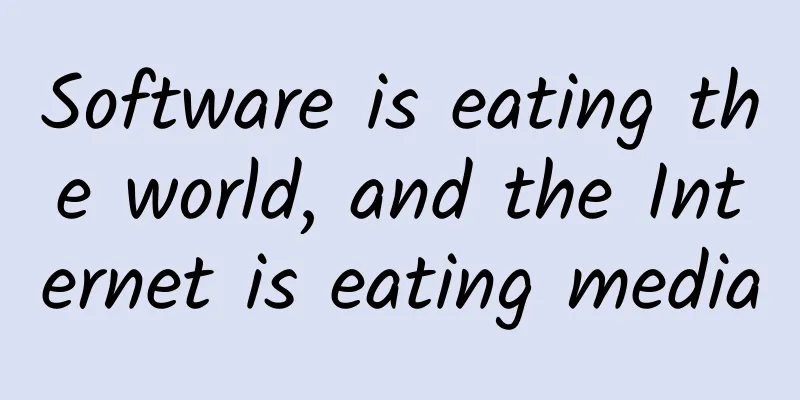Software is eating the world, and the Internet is eating media

|
The success of technology and media products depends on the interaction of many factors, such as product, economic, technological and cultural factors. When a product is first launched, it is difficult to predict whether it will be popular. In this era, hundreds of millions of people carry powerful computing devices that are small enough to fit in their pockets. With these devices, we have access to all the knowledge accumulated by humans over thousands of years, and social media has become an indispensable part of our lives. One social media company, Facebook, has even become one of the 10 most valuable companies in the world. Just ten years ago, if someone predicted that social media products would take the world by storm, many people would have thought he was dreaming. I'm reminded of a quote from William Gibson: The future is already here - most people just don't realize it yet. This raises the question: If the future is already here, where can I find it? It's not easy to answer this question, but history has shown us similar things before. For example, we can often see what the smartest people are working on in their spare time, or what things are being quickly adopted by people, while most people just regard them as toys. Another way to predict the future is to find communities that fit Darwin’s evolutionary experiment. Entrepreneurs are experimenters, and their main job is to try various experiments (VCs are the ones who provide them with experimental funds). The experiments conducted by entrepreneurs are to find the exit in the creative maze, so as to discover those products and business models that can achieve success. Even if you don't have any interest in PC gaming, if you're interested in the media, you should cultivate an interest in PC gaming. Over the past decade, the PC gaming industry has been a hotbed of entrepreneurial experimentation for many reasons. Many of these experiments have led to new products and business models -- some of which are surprising and counterintuitive. Moreover, PC gaming has not only grown rapidly itself, but has also provided valuable lessons for other players in the media industry. The PC gaming industry is bigger than you think Many PC games are played on Valve Software's Steam platform, which is incredibly large, with more than 125 million active users. If you're not a gamer, you may have never heard of Steam or the roughly 4,500 games it hosts, including some of the world's most popular games. The game categories on the Steam platform are very diverse, and the business models of these games are also different. For example, the most popular game on this platform is Dota 2. This game adopts a free business model. Its revenue comes from players' in-game purchases. During the game, players can buy various unique equipment to add to their characters.
Steam's revenue is to collect profit sharing (about 30%) from games on the platform. It is reported that the platform's revenue last year reached 1.5 billion US dollars. In addition, Valve also produces games itself, and Dota 2 is one of the company's own games. PC games have taken the world by storm. These games are extremely popular in Asia, especially in South Korea. How successful are games in South Korea? Consider this: the South Korean government has even enacted a law that prohibits children from playing games for more than a certain amount of time a day, and that every game must have a warning to the player, reminding them of the dangers of game addiction. Putting the “free” back into the “freemium” model Many companies today use the "freemium" business model, so we are all familiar with this model. For example, Dropbox provides users with the most basic practical functions. If users want to use more functions or want more cloud storage space, they need to pay for it. South Park’s Freemium Model The PC gaming industry has taken the freemium model to its limits. Smartphone games such as Candy Crush often let players buy functional props, but PC games cannot do this because if users can only beat other players by spending money, they will think that the game company's practice violates the principle of "fair competition." Therefore, on PC games, players usually pay to buy personalized equipment that players can wear on their characters in the game to show their uniqueness. For example, League of Legends, one of the most popular PC games on Steam, earned $1 billion in revenue last year by selling these personalized equipment. And with its huge popularity, PC gaming companies can also generate revenue from live events. Live online gaming competitions have contributed greatly to gaming companies' revenues in recent years: more than 32 million people watched this year's League of Legends matches, which is almost twice the number of people who watched the NBA Finals.
2014 League of Legends Championship Users can watch the live broadcast of the game online for free, but if players want to watch the game in person, they need to pay a ticket fee of 50-100 US dollars. This is very similar to the current music industry. Today, concert ticket revenue has become the main source of income for musicians. As the price of digital music continues to fall, the price of live concert tickets is rising. The PC gaming industry has discovered one thing: in today's media-rich age, users have endless choices; game companies no longer fight for resources, but for user attention. Maximize user engagement, and revenue will inevitably follow (of course, you need to conduct enough experiments in the process). Embrace user adaptations and MODs In the gaming world, MOD refers to the adaptation of a game by a user, or the addition of new elements to a game. There are about 4,500 games on the Steam platform, of which there are about 400 million pieces of user-generated content. The game Dota itself originated from the adaptation of another game (Warcraft 3) by a user. In this regard, the gaming industry is completely different from the music industry. The music industry attaches great importance to intellectual property rights, and they will be very aggressive in stifling unauthorized changes. Large record companies often use the law to protect their music content. This means that sometimes they will take their competitors to court, and sometimes they will take their own users to court. The consequence of this is that new experiments have been completely frozen. Now, almost all music-related technology products have not escaped the shadow of previous similar products. The cost of innovation is too high and the risk is too great. For example, one of the best music product experiments of our time is Turntable.fm, an app that invented a whole new way to discover and enjoy music. However, the company eventually closed down. When shutting down its service, the company's founder said: "Ultimately, I realized that I had not paid attention to the experience of previous music product startups. This was a very expensive journey, and the music industry was a very difficult industry to work with. More than a quarter of our cash was spent on lawyers and royalties. The industry was very restrictive, and our growth was stagnant because we could not release products in the international market. It took us years to negotiate with record companies to obtain music rights, and then spend months on engineering work, which would have been much better if we spent this time on product development." Book adaptations are very common on services such as Wattpad. When users read a good book or see a good movie, they can write a similar book and publish it on the platform. From a legal perspective, some adaptations may infringe the original author's copyright. But from a business perspective, the book industry is actually very wise to learn from the practices of the PC game industry. Instead of taking the changers to court, the book industry encourages readers to change, thereby helping them to promote and increase readers' enthusiasm for participation. There is also a hybrid that has emerged in the market, where they have successfully combined gaming with podcasting, such as Twitch, where users can watch other people play video games and the hosts can interact with viewers. Why do these people watch other people play games on Twitch? If you ask them this question, they will definitely say: "It's cheaper to watch other people play games than to play games themselves." From a legal perspective, game companies can easily take these game anchors to court, but they don't do so. On the contrary, they encourage these people. Because game companies know that these game anchors can help them promote and make more people interested in the game. Crowdfunding and user feedback PC games have also actively embraced crowdfunding, a new form of financing and marketing. On Kickstarter, games (mostly PC games) have become the product category with the highest user interest: And that doesn't include games that have been crowdfunded on other sites, such as the largest crowdfunded game of all time: a PC game called Star Citizen, which has raised $94 million from more than 1 million users. And on its user forum, the game has received 4 million comments from users. Obviously, the funds from crowdfunding are very important, but equally important is the participation of users. Almost all well-known video games through crowdfunding have one thing in common: the level of user interaction in the forums of these games themselves is also very high. In addition to crowdfunding, PC games have also adopted another similar marketing method: pre-release, which is to release the game before the game is completed. Minecraft can be said to be the most successful game that uses this marketing method. It has successfully sold more than 1 million copies of the genuine game. Through continuous user feedback, the game developers have gained huge benefits, and users can continue to contribute to their favorite games. Another change in the game industry is the shift from a wholesale model to a retail model. Joahn Peretti of BuzzFeed once said: "The biggest problem with the traditional media industry is that you create content and then get rewards. But in this process, you have almost no interaction with consumers. In fact, feedback or data from consumers will be of great help to you in the future. We hope to find another model in which we can exchange information and inspiration with real audiences. This model is both an art and a science-you can get better and better through continuous learning. This means that we should regard media as a service, not just a product. Technology companies often regard themselves as retailers to gain a deeper understanding of consumers. Traditional media companies always regard themselves as wholesalers. In the product sales process, they are willing to sell their products to the person who bids the highest. The problem is that the advantage of retailers is that they understand what consumers really need and their experience in the process of using the product. It is difficult for wholesalers to do this." Companies like BuzzFeed can be said to be pioneers of this shift. The PC gaming industry has embraced this shift earlier than the media industry. Looking ahead Software is eating the world, and the Internet is eating media: Old media - TV, movies, books, music, etc. - will have a harder and harder time surviving in this new world. By 2020, 4 billion people will have smartphones that can access the Internet. By then, traditional media companies will be overwhelmed by the Internet. If we can recognize this change and learn how to deal with it, maybe we still have a chance. For example, Netflix has successfully accepted the retail model. Reed Hastings of the company said: "We are just a learning machine. Every time we broadcast a new series, we analyze it, find out what we did well and what we did not do well, and continue to improve our work next time." The Internet has completely crushed traditional business models, especially those focused on legal isolation. But the PC gaming market has also shown us another side of the Internet: it can bring us new business models and provide media content producers with a whole new way to interact with consumers like never before. |
<<: If you want to learn Android, you might as well listen to how engineers are trained
>>: 12 skills you need to become a millionaire
Recommend
Do you really know how to use Apple iCloud? You may not know all of these 7 hidden features
You may only notice the existence of Apple's ...
After applying it, the skin becomes transparent, and the blood vessels and muscles are clearly visible...
Produced by: Science Popularization China Author:...
In the era of content e-commerce, what are the techniques for improving conversion rates?
Yippin’s online [Pin Shuo] column did a discussio...
Hands-on experience of ROCK smart business card case, a business and social tool
Every time I attend a meeting or a party, I alway...
The 4 user quadrants of product promotion!
When we promote our products , the first thing we...
How to join Jack Ma's facial recognition payment, and how much is the facial recognition payment agent fee?
Speaking of the most popular project in 2019, it ...
90% of Xiaohongshu operators will encounter these problems! Attached is the strategy analysis!
Since Xingyuan officially opened up contract incu...
Projects that use information asymmetry to make money in 2021: group fission + freight to be paid
Information asymmetry will always exist, and peop...
Analysis of Sogou bidding promotion conversion, display and click-through rate!
Recently, a classmate left a message: "The c...
You can use your phone now, all thanks to a sentence he said 50 years ago
On March 24, 2023, American scientist and entrepr...
Is it possible that some super theory will emerge in the future that will cause existing physical theories to collapse?
This article is based on answering similar questi...
What marketing trends will emerge in 2019?
What marketing trends will emerge in 2019? If wha...
The era of online video bandits has ended, and mobile video UGC sharing is about to explode
Typhoon Mouth A crackdown on piracy and pornograp...
WeChat blocks external links to multiple products including Zhihu, Kuaishou, and Pinduoduo
[[375761]] The WeChat Security Center has issued ...
4 Steps to Improve User Retention!
For a product, retention rate is the most importa...









